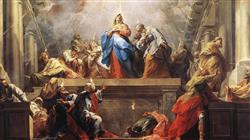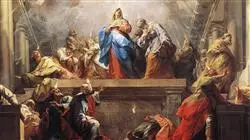University certificate
The world's largest faculty of humanities”
Introduction to the Program
Identify the defining structural features of the Church in the Middle Ages, explaining its evolution chronologically”

When Darwin's book On the Origin of Species was published, it opened up a discussion that tried to give a plausible and simple answer to life, without the need to resort to explanations of a theological nature, which were the arguments that supported the existence of God. From that moment on, the Magisterium began to be a controversial topic, and it continues to be so to this day.
In this Professional master’s degree in History of the Church and the Magisterium, a group of experts trained in the area will provide all the criteria to allow students to understand the current position of the institution, while considering the historical events that developed it throughout the centuries.
Therefore, the syllabus will begin by recognizing the main historical milestones of the social Magisterium. Here we will highlight the period of Hellenization, which spans the conquest of the Persian Empire by Alexander the Great (331 B.C.) to the rise of the Roman Empire (31 B.C.).
Knowledge of events in different periods, such as the 19th and 20th centuries, will help to understand the role of the Church in modern society, especially in Latin America. To this end, specific study topics are proposed in which some events such as the First General Conference of the Latin American Episcopate, held in Rio de Janeiro in 1995, will be presented in detail.
In this way, the program is a compendium of knowledge that will help students provide answers to modern questions. Thus, students will be able to conduct academic research or teach in the area.
Acquire an improved notion of the Magisterium and understand the nature of the reflection it offers on temporal questions or questions of social order”
This Professional master’s degree in History of the Church and the Magisterium contains the most complete and up-to-date program on the market. The most important features include:
- Case studies presented by experts devoted to History of the Church and the Magisterium
- The graphic, schematic, and practical contents with which they are created, provide epistemological and practical information on the disciplines that are essential for professional development
- Practical exercises where the self-assessment process can be carried out to improve learning
- Special focus on innovative methodologies in the study of History of the Church and the Magisterium
- Theoretical lessons, questions to the expert, debate forums on controversial topics, and individual reflection assignments
- Content that is accessible from any fixed or portable device with an Internet connection
The History of the Church is extensive and highly nuanced, which you have to know in order to propose new answers to the social order”
The program’s teaching staff includes professionals from the sector who contribute their work experience to this program, as well as renowned specialists from leading societies and prestigious universities.
The multimedia content, developed with the latest educational technology, will provide the professional with situated and contextual learning, i.e., a simulated environment that will provide immersive specialization programmed to learn in real situations.
This program is designed around Problem-Based Learning, whereby the professional must try to solve the different professional practice situations that arise throughout the program. For this purpose, the student will be assisted by an innovative interactive video system created by renowned and experienced experts.
Become familiar with the main events that influenced the transformation of the Christian world in Europe"

Grasp the various logical levels of knowledge generated by the Magisterium.
Why study at TECH?
TECH is the world’s largest online university. With an impressive catalog of more than 14,000 university programs available in 11 languages, it is positioned as a leader in employability, with a 99% job placement rate. In addition, it relies on an enormous faculty of more than 6,000 professors of the highest international renown.

Study at the world's largest online university and guarantee your professional success. The future starts at TECH”
The world’s best online university according to FORBES
The prestigious Forbes magazine, specialized in business and finance, has highlighted TECH as “the world's best online university” This is what they have recently stated in an article in their digital edition in which they echo the success story of this institution, “thanks to the academic offer it provides, the selection of its teaching staff, and an innovative learning method aimed at educating the professionals of the future”
A revolutionary study method, a cutting-edge faculty and a practical focus: the key to TECH's success.
The most complete study plans on the university scene
TECH offers the most complete study plans on the university scene, with syllabuses that cover fundamental concepts and, at the same time, the main scientific advances in their specific scientific areas. In addition, these programs are continuously being updated to guarantee students the academic vanguard and the most in-demand professional skills. In this way, the university's qualifications provide its graduates with a significant advantage to propel their careers to success.
TECH offers the most comprehensive and intensive study plans on the current university scene.
A world-class teaching staff
TECH's teaching staff is made up of more than 6,000 professors with the highest international recognition. Professors, researchers and top executives of multinational companies, including Isaiah Covington, performance coach of the Boston Celtics; Magda Romanska, principal investigator at Harvard MetaLAB; Ignacio Wistumba, chairman of the department of translational molecular pathology at MD Anderson Cancer Center; and D.W. Pine, creative director of TIME magazine, among others.
Internationally renowned experts, specialized in different branches of Health, Technology, Communication and Business, form part of the TECH faculty.
A unique learning method
TECH is the first university to use Relearning in all its programs. It is the best online learning methodology, accredited with international teaching quality certifications, provided by prestigious educational agencies. In addition, this disruptive educational model is complemented with the “Case Method”, thereby setting up a unique online teaching strategy. Innovative teaching resources are also implemented, including detailed videos, infographics and interactive summaries.
TECH combines Relearning and the Case Method in all its university programs to guarantee excellent theoretical and practical learning, studying whenever and wherever you want.
The world's largest online university
TECH is the world’s largest online university. We are the largest educational institution, with the best and widest online educational catalog, one hundred percent online and covering the vast majority of areas of knowledge. We offer a large selection of our own degrees and accredited online undergraduate and postgraduate degrees. In total, more than 14,000 university degrees, in eleven different languages, make us the largest educational largest in the world.
TECH has the world's most extensive catalog of academic and official programs, available in more than 11 languages.
Google Premier Partner
The American technology giant has awarded TECH the Google Google Premier Partner badge. This award, which is only available to 3% of the world's companies, highlights the efficient, flexible and tailored experience that this university provides to students. The recognition as a Google Premier Partner not only accredits the maximum rigor, performance and investment in TECH's digital infrastructures, but also places this university as one of the world's leading technology companies.
Google has positioned TECH in the top 3% of the world's most important technology companies by awarding it its Google Premier Partner badge.
The official online university of the NBA
TECH is the official online university of the NBA. Thanks to our agreement with the biggest league in basketball, we offer our students exclusive university programs, as well as a wide variety of educational resources focused on the business of the league and other areas of the sports industry. Each program is made up of a uniquely designed syllabus and features exceptional guest hosts: professionals with a distinguished sports background who will offer their expertise on the most relevant topics.
TECH has been selected by the NBA, the world's top basketball league, as its official online university.
The top-rated university by its students
Students have positioned TECH as the world's top-rated university on the main review websites, with a highest rating of 4.9 out of 5, obtained from more than 1,000 reviews. These results consolidate TECH as the benchmark university institution at an international level, reflecting the excellence and positive impact of its educational model.” reflecting the excellence and positive impact of its educational model.”
TECH is the world’s top-rated university by its students.
Leaders in employability
TECH has managed to become the leading university in employability. 99% of its students obtain jobs in the academic field they have studied, within one year of completing any of the university's programs. A similar number achieve immediate career enhancement. All this thanks to a study methodology that bases its effectiveness on the acquisition of practical skills, which are absolutely necessary for professional development.
99% of TECH graduates find a job within a year of completing their studies.
Professional Master's Degree in History and Magisterium of the Church
The magisterium of the Church is the official teaching of the Catholic Church on faith and morals, formulated by the bishops and the pope. The magisterium is based on the Bible, tradition and other teachings that have developed throughout the history of the Church. Some of the most important teachings include the Trinity, the virginity of Mary, transubstantiation and papal infallibility.
Church History: This is an in-depth study of the history of the Catholic Church, from its origins in the early Church to the present day.
Magisterium of the Church: The magisterium refers to the authoritative teaching of the Catholic Church on faith and morals.
Moral Theology: Reflection and analysis of Catholic morality and how it applies to everyday life.
Theology and Church History.
The history of the Church is divided into several periods, from the early persecuted Christians to the contemporary Church. In the early centuries, Christians were persecuted and executed by the Roman authorities, but after the Edict of Milan in 313, Christianity was accepted as the official religion. In the Middle Ages, the Catholic Church became the most influential institution in Europe, with the creation of monasteries, the construction of cathedrals and the Crusades. In the Renaissance, the Church was one of the main promoters of art and culture, and in the Protestant Reformation of the 16th century there was a break with Catholicism that led to the creation of new Christian denominations.
The Catholic Church has played an important role in world history, and has faced many challenges over the centuries, such as the Reformation, religious wars, the Enlightenment and secularization.
Learn in detail about the history and magisterium of the Church, delving into a vast and complex subject through our program covering many centuries of religious and cultural development.







